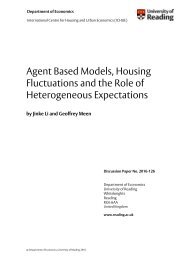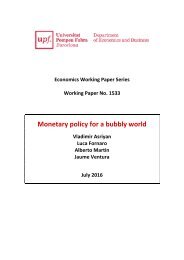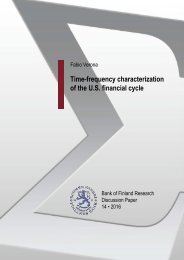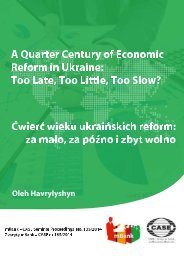Necessity as the mother of invention monetary policy after the crisis
n?u=RePEc:dnb:dnbwpp:525&r=mac
n?u=RePEc:dnb:dnbwpp:525&r=mac
Create successful ePaper yourself
Turn your PDF publications into a flip-book with our unique Google optimized e-Paper software.
Table 17. Central bank independence during <strong>the</strong> <strong>crisis</strong><br />
Governors Academics Chi-sq.<br />
All AEs vs. all vs. AEs<br />
CB independence w<strong>as</strong> ______ during <strong>the</strong> <strong>crisis</strong> (NG=54, NA=158) 34.8*** 15.0***<br />
Gained 13.0 0.0 5.1<br />
Nei<strong>the</strong>r gained nor lost 79.6 93.8 43.0<br />
Lost a little 1.9 6.3 40.5<br />
Lost a lot 1.9 0.0 4.4<br />
Difficult to say 3.7 0.0 7.0<br />
Notes: Percentages <strong>of</strong> number <strong>of</strong> responding governors or academics. *** denotes significance at<br />
<strong>the</strong> 1% level, calculated using Chi-squared tests for <strong>the</strong> independence <strong>of</strong> responses <strong>of</strong> governors and<br />
academics. NG/NA denotes number <strong>of</strong> responding governors/academics. Source: Authors’<br />
calculations b<strong>as</strong>ed on survey among central bank governors conducted in 2016.<br />
Despite <strong>the</strong> high χ 2 statistics, <strong>the</strong>re is more agreement here than meets <strong>the</strong> eye.<br />
Specifically, <strong>the</strong> share <strong>of</strong> respondents who believe that central bank independence ei<strong>the</strong>r<br />
did not change or w<strong>as</strong> reduced only “a little” w<strong>as</strong> more than 90% among central bank<br />
governors and more than 80% among academics. Thus <strong>the</strong> clear answer to <strong>the</strong> question<br />
w<strong>as</strong>: Little or none.<br />
These subjective opinions are corroborated by de Haan and Eijffinger (2016) using<br />
“objective” data provided by Bodea and Hicks (2015). These authors expanded <strong>the</strong><br />
Cukierman et al. (1992) index <strong>of</strong> legal central bank independence for 78 countries from<br />
<strong>the</strong> end <strong>of</strong> <strong>the</strong> Bretton Woods system until 2010, <strong>the</strong>reby creating an original data set that<br />
codes CBI annually and—importantly for current purposes—covers changes in <strong>the</strong> l<strong>as</strong>t<br />
twenty-five years. Table 18 shows <strong>the</strong> average level <strong>of</strong> legal CBI before and <strong>after</strong> <strong>the</strong> start<br />
<strong>of</strong> <strong>the</strong> financial <strong>crisis</strong> for several groups <strong>of</strong> countries (b<strong>as</strong>ed on IMF cl<strong>as</strong>sifications). While<br />
<strong>the</strong> index remained stable for <strong>the</strong> Fed, <strong>the</strong> ECB and <strong>the</strong> Bank <strong>of</strong> England, <strong>the</strong> data suggest<br />
that, if anything, CBI incre<strong>as</strong>ed <strong>after</strong> 2007.<br />
Table 18. Legal CBI before and <strong>after</strong> <strong>the</strong> Global Financial Crisis<br />
1995-2007 2008-2010<br />
Advanced economies 0.63 0.69<br />
Emerging and developing economies 0.59 0.67<br />
Source: de Haan and Eijffinger (2016) using data from Bodea and Hicks (2015), which are available<br />
at: http://www.princeton.edu/~rhicks/data.html. The cl<strong>as</strong>sification <strong>of</strong> countries follows <strong>the</strong> IMF’s<br />
World Economic Outlook.<br />
5.4. Back to <strong>the</strong> status quo ante?<br />
If <strong>the</strong> <strong>crisis</strong> moved <strong>the</strong> line between <strong>the</strong> realms <strong>of</strong> fiscal and <strong>monetary</strong> <strong>policy</strong>, perhaps<br />
inevitably, w<strong>as</strong> <strong>the</strong> status quo ante restored <strong>the</strong>re<strong>after</strong>? Could it be? Should it be? The<br />
answer to <strong>the</strong> first question, at le<strong>as</strong>t, varies by country. One re<strong>as</strong>on is that <strong>the</strong> degree to<br />
which <strong>the</strong> <strong>crisis</strong> is “over” also varies from country to country.<br />
37








